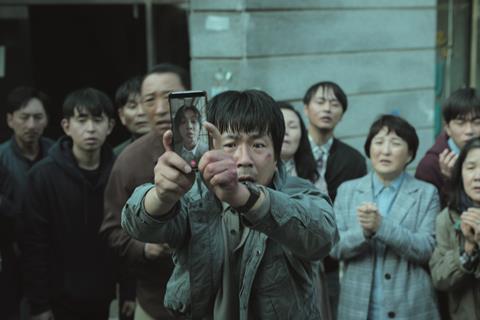
The world seemed primed for more Korean content after Bong Joon Ho’s Parasite became the first non-English-language film to win the best picture Oscar in 2020.
Decades of K-pop, K-drama and Korean film fandom and expertise had been simmering in and out of mainstream media consciousness, but never on the level of Hwang Dong-hyuk’s series Squid Game. On its release in late 2021, the Netflix show became a global phenomenon, and other examples of Korean content such as Yeon Sang-ho’s Hellbound (also Netflix) and Pachinko (Apple TV+) have been drawing international attention.
Squid Game’s release on a widespread global OTT platform accompanied by almost equally simultaneous conversations on international social media saw unprecedented results. “Squid Game is our biggest show to date,” reported Netflix. “At its peak, it was number one in 94 countries — from Brazil and France, to India and Turkey — every country in the world where Netflix has a top 10 list. Ninety-five percent of Squid Game viewership came from outside Korea, and it is massively popular in Korea.”
Netflix noted of Hellbound that viewing hours reached 43.5 million at launch. “It was among the top 10 in 93 countries, and number one in 34 countries.”
“Of course, you believe in the potential of all your work to connect with people and you labour towards that, but who could have imagined this level of reaction?” says Hwang, Squid Game’s writer, director and executive producer. “No matter which country you go to, which age group you meet, there’s almost no-one who doesn’t know about it.”
Hwang, whose features include My Father (2007) and Miss Granny (2014), came up with the idea of a deadly competition for a life-changing cash prize back in 2009, when he was in dire straits and visiting comic-book rental stores “where I could spend time cheaply”, reading series such as Battle Royale and Liar Game.
“I was in debt, so I thought it would actually be better to be able to participate in a gambling game like those but realised that, with my brain and limitations, I wouldn’t make it past level one,” says Hwang. “But if it were games like the ones we played as kids, maybe even a person like me could win — and that was where the original idea for a film came from.”
At the time, local investors told him Squid Game was “too unrealistic” and expressed concerns over the level of violence that would get the film an age 19+ rating in Korea, limiting its box-office potential. It was almost 10 years later, when Netflix had come to Korea and was making popular local-language series such as the political period zombie thriller Kingdom, that Hwang decided to take the project to the streamer, thinking the characters and story could be better served in episodic form.
“It seemed to me it could have more potential as a series aimed at global viewers who might be more open-minded and used to genre,” he says. “It’s a story about haves and have-nots risking their lives to compete for a massive fortune, and the polarisation and inequality that is an overall trend in the world makes it relatable in any country.
“The characters were also identifiable as people you could relate to and root for or be angry at,” Hwang continues. “The simple symbols I used in the show — circles, triangles and squares, the colours, the Younghee [robot] doll and the clothes were all eye-catching visuals that could transcend cultures and languages in eliciting curiosity even from children.”
Hwang notes Korean creators have been honing and showing their film- and series-making skills on an international level for decades, but the effects of simultaneous OTT distribution has been a gamechanger.
“Maybe Squid Game was the frontrunner but people are taking interest in more and more works from around the world, knowing that language need not be a problem in enjoying them,” he says.
Universal ideas

Hellbound creator and showrunner Yeon agrees, noting he had acquired international recognition with his zombie thriller Train To Busan, which premiered in Cannes’ Midnight Screenings in 2016 and clocked up a $140m worldwide gross. But the immediate effect of Hellbound was different.
“It has an entertaining structure, but it’s not necessarily recreational,” Yeon says, pondering how the series became so successful. “It gives you a lot to think about and that seems to have worked well not just in Asia but also, more to my wonder, in Europe.”
Hellbound started with Yeon’s animation short The Hell, which he and his friend, illustrator Choi Gyu-Seok, expanded on to create a ‘webtoon’ — a Korean internet comic series — for Korean portal site Naver. In it, otherworldly beings deliver condemnations and attack people, sending them to hell, which gives rise to a religious group operating on the idea of divine justice but also wielding a violent side unit.
“It’s about people who put blind faith in ideologies or who can’t live without some sort of great meaning,” Yeon says. “We all think about our reasons for existence, and in a way, reasons for existence could be ideologies for some people or religion or professional ethics for others or, for people who make films, filmmaking. But are these things we believe in manipulated?
“In the case of Korea, it has gone through dictatorships and democratisation and, worldwide, people have gone through the Cold War ideologies,” he adds. “These days, the question of what is more politically correct is also a concern. In the midst of this sort of chaos, I wanted to resolve some frustrations through this story of people staking their lives on interpreting an enormous supernatural phenomenon.”
Yeon posits that the success of recent Korean films and series like his comes “with a measure of luck” after Parasite and Squid Game, but also harks back further to titles such as Lee Chang-dong’s gangster film Green Fish (1997) and Im Kwon-taek’s Cannes award-winning period piece Chihwaseon (2002), as well as two watershed 2003 films: Park Chan-wook’s revenge thriller Old Boy and Bong’s detective thriller Memories Of Murder.
“Old Boy was shocking not only in its content but how well made it was and the level of storytelling we hadn’t seen before in Korean films,” says Yeon. “Memories Of Murder came out the same year. They had a profound influence. Anyone who started working around that time and is still active today [in Korea] would be lying if they said [these films] didn’t influence them.”
Yeon also points to the global popularity of Hong Kong noir films — “John Woo and Chow Yun Fat had a great influence on the west” — as well as ‘Japanimation’ as proof that “Asian content has always attracted global attention and had an influence”.
Korean artists and creators like Hwang and Yeon are, fundamentally, artists and creators who are less interested in the international politics of ‘soft power’ from cultural influence and more interested in sharing ideas and creativity.
As Hwang notes: “Culture is about exchange, not unilateral exportation. The way I was influenced by seeing American movies and series, Korean content can influence people in other countries and stimulate them to make their own content that will come back over to us, and so on. So this is an opportunity for the world to understand the world.”
Yeon counts himself as “more of a geek” than anything and is happy to be in talks to make his own adaptation of a Japanese manga series of which he is a longtime fan, while also working on multiple projects including Hellbound’s second season as a webtoon ahead of its live-action version.
Hwang is equally busy with projects, including KO Club (aka Killing Old Men Club) based on an Umberto Eco novel, and season two of Squid Game — yet to announce dates but circling for a landing.
“I don’t want to keep the fans waiting too long,” he says.















![[L-R]: Amanda Villavieja, Laia Casanovas, Yasmina Praderas](https://d1nslcd7m2225b.cloudfront.net/Pictures/274x183/6/4/1/1471641_pxl_20251224_103354743_618426_crop.jpg)









No comments yet